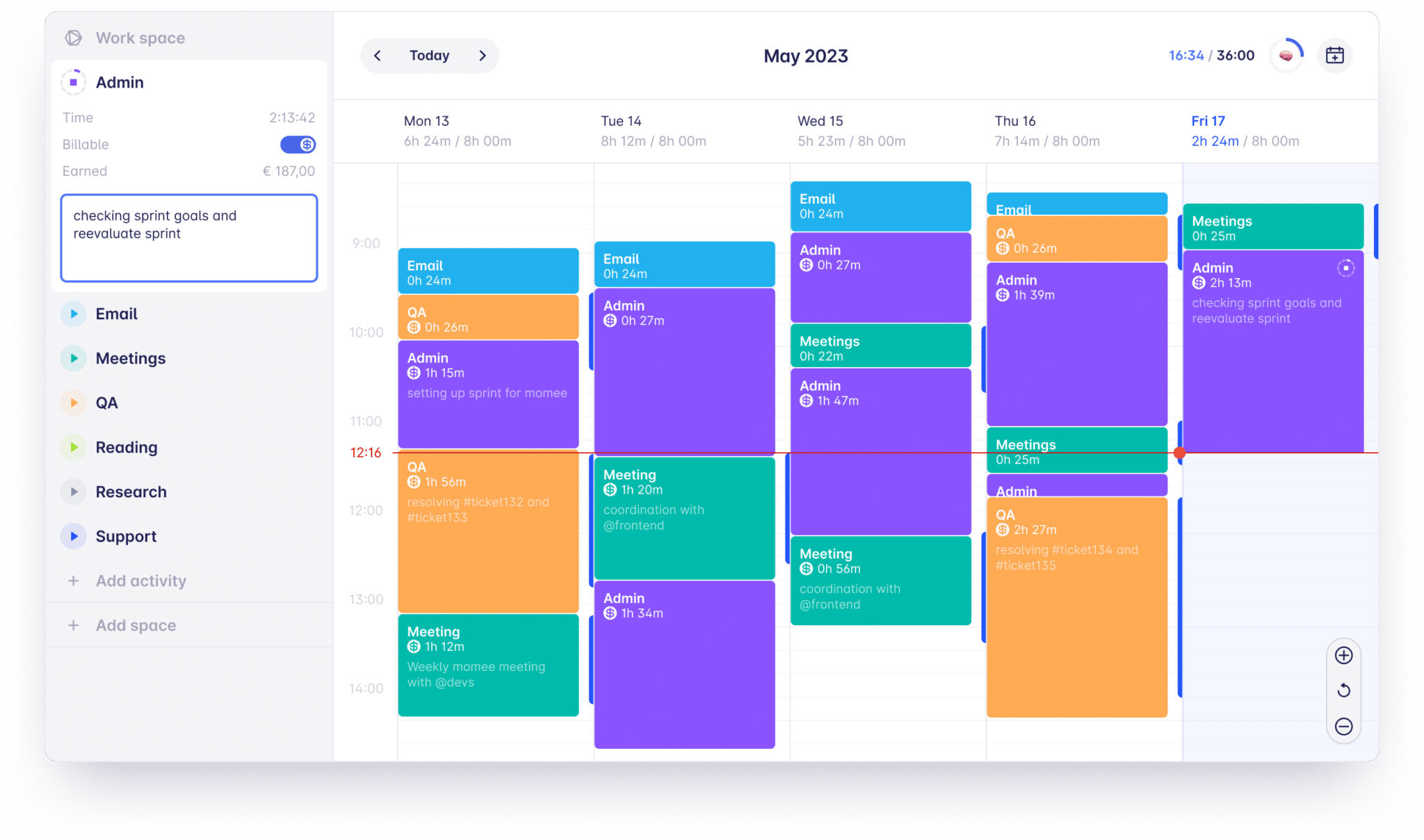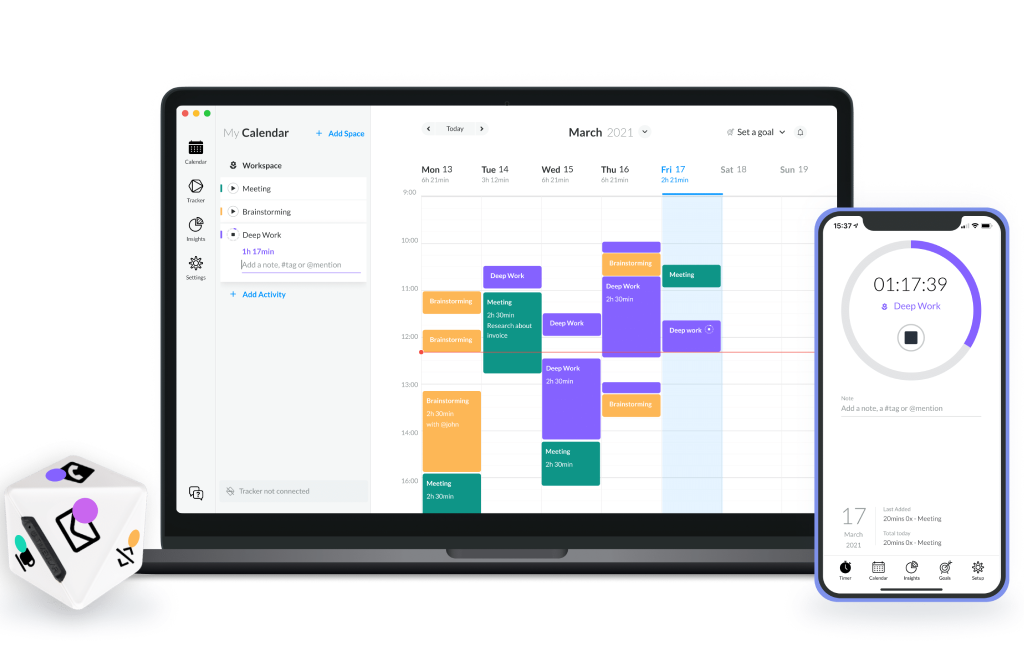5 Steps How to Deal with Lazy Coworkers
We’re about to discuss a scenario you may have encountered in your professional life once or twice.
Having a lazy coworker is a common situation that, if left unattended, can negatively affect a team. As a colleague, follow our tips on how to deal with lazy coworkers.

Get to the root of employee disengagement
Track employee hours and uncover the root causes of disengagement to enhance team motivation
As a fellow coworker, you can help handle the situation, but remember that you don’t make the final decisions. The issue has to be handled with care, and a helpful teammate can make a difference in some cases.
It’s also perfectly understandable that the situation makes you frustrated and angry. In this case, take a step back. However, your manager needs to address the problem.
How to deal with lazy coworkers in 5 steps
1. Approach them with professionalism and care
It’s a colleague, and we’re sure you’re not trying to throw people under the bus just because. However, it’s also true that a situation of this kind can reach epic proportions of frustration.
When dealing with this issue, follow the path of business etiquette, at least as a first option.
You should approach your offending colleague with professionalism and care in an honest conversation.
Let them know that the work habits they acquired are affecting you and your ability to do your job properly.

eBook: How to plan your team’s time?
Get your free copy and discover how to leverage the power of time tracking in your team.
Never have this conversation when you’re angry. In two seconds, you may escalate the issue instead of solving anything.
You need to state your case in a matter-of-fact way, explaining how their laziness affects you. Don’t be judgemental or condescending, don’t attack their character.
Their behavior can be triggered by many reasons other than lack of character.
Don’t you know how to recognize a lazy workmate? Find the signs of a lazy coworker to look out for in our blog.

2. Empathize with them and seek other’s opinions
When you have an honest conversation with your coworker, try to put yourself in their shoes for a little bit.
You don’t know what’s going on in their head. You’re not privy to their personal lives and problems or what’s happening behind the scenes.
There are several reasons they’re feeling and being unproductive. They may be going through complicated personal issues and worried about their families for some reason. They may be having money problems, or they may be burned out.
It’s possible that your colleague isn’t trying to escape work but feels overwhelmed.

Get to the root of employee disengagement
Track employee hours and uncover the root causes of disengagement to enhance team motivation
Knowing whether your lazy coworker’s approach is intentional or unintentional is helpful and important.
After reaching out and talking to the lazy coworker, find out if other colleagues feel the same as you about this issue. Maybe their work is being affected as well by this same person.
Try not to fall into simple gossiping about someone else, and make sure it’s about whether you see the situation accurately, with no emotions attached.
3. Don’t become distracted from achieving your goals
You’re his/her coworker, not the superior manager.
If you’re bothered by their behavior, don’t perpetuate that negative influence on your daily life. And don’t waste your time worrying about that person if your conversation or advice wasn’t well received.
In this case, it’s probable that this lazy coworker doesn’t really care about how you feel. Don’t let these situations distract you from the important things in your work life.
Invest your time in focusing on your priorities with a clear conscience that you did the best you could to help.
Leading with these issues in the workplace is a mental health risk. It’s not worth it.
Make sure you’re protecting yourself.
4. Think thoroughly before taking action
Thinking before acting is always a wise choice. Something that also applies when dealing with a lazy coworker.
By now, we know that we’re dealing with sensitive situations.
So, before reacting to any situation, you should ask yourself this question:
how do I want to be perceived by other people in my team, in my office, or even in the business/industry?
You can act with the best intentions, and your behavior might still be perceived as gossipy, unkind, jealous, etc. Your professional image can be tainted.
Your superiors may feel that you’re too emotional and not the best choice to become a trusted leader based on how you react to tough situations.

eBook: How to plan your team’s time?
Get your free copy and discover how to leverage the power of time tracking in your team.
What you need to do is balance out the pros and cons.
Your superiors might already know who’s working and who’s slacking off, and they’ll wait for when the moment is right to confront the person in question.
Take the time to consider all the roads you can take.

5. Reach out to your superiors
Drowning in work is one of the top causes of stress at work.
So, if you’re feeling stressed and overwhelmed by this situation, the final step is to speak to your manager or the company’s Human Resources.
You can broach the subject in different ways. If you gathered a good rapport with the lazy coworker in question, you may decide to reach out to your superiors for support.
If your efforts weren’t successful, you need to be strategically professional when discussing the matter. Be professional, not petty.
Explain how you’ve attempted to handle the matter privately, to no avail. Prove how your lazy coworker is hurting the company.
Make sure you’re not making a complaint about your personal distress about the situation. Make your point for the success of the team and the company.
Tips on how to deal with lazy coworkers
1. Provide guidance
And as helpful as you want to be, if your willingness to help becomes an everyday occurrence, you’re being taken advantage of.
It’s normal and perfectly fine that you’d want to help when someone close to you asks for help. What we advise you to do is not waste too much of your own time.
Offer suggestions and guidance to improve workload management, for example, adopting prioritization techniques such as RPM, RICE or ABCDE.
Suggest a follow-up meeting or get together to touch base and check on them.
2. Don’t let yourself be influenced
If you’re a high performer, don’t allow yourself to be influenced by lazy coworkers, even if your superiors seem to not care about the situation.
Lazy behaviors can be perpetuated and affect your reputation. Always give your best effort. It’ll be worth it in the long run.

3. Try to help them with a time tracker
A time tracker can be very helpful to your coworker. So, if your colleague is open to your suggestions and help, advise him to use a time-tracking tool.
Time tracking is one of the best time-saving tips you can give them. A reality check can help them get back on track by identifying their time wasters at work.
Don’t you know what time tracking is and its advantages? Get to know everything about this game-changer.

Looking for the most effortless & accurate time tracking tool for your team?
4. Attempt to discuss possible solutions
If you have good ideas, share them.
Follow up with your boss regarding the plan of action and try to help the coworker address the issue.
There is probably something you can help with for the common good of the work team.
5. Stay positive and healthy
Procrastination can be fought with healthy habits. Be sure to take breaks and encourage your colleagues to take pauses, walk around for a bit…
Ask the company to provide snacks, water, and whatever else the employees may need to help them feel comfortable.
Remember that you control your own attitude, though. Rise above pettiness and discussions and be professional.
Remember that your mental health and well-being are more important than anything. Choose to protect that.
Conclusion
Hopefully, this 5-step plan and these 5 tips can help you lead with a lazy workmate.
It’s important that you can help when your lazy coworker is open to that, but you can’t let yourself fall into the same cycle your colleague is in.
You need to know how to manage your frustration and push back when necessary. After trying to handle it, you can best hold your coworker accountable for their work.
However, the way you decide to deal with a lazy workmate, remember to maintain your professionalism.
You can’t control others’ actions, but you can control yours.
FAQ
What are the signs of a lazy coworker?
Usually, a lazy coworker presents excuses for everything, fails deadlines, and misses meetings.
These are some signs of a lazy coworker. Read our blog and get to know all of them.
Should I report a lazy coworker?
Reporting a coworker should not be your go-to solution. Doing so will hurt your reputation and damage how your colleagues and superiors look at you.
Start by reaching out to your lazy coworker privately and following the plan discussed in this article.
Only when that doesn’t work should a superior be called into action. Even then, professionally approach them, and let them know that you’ve attempted to handle the matter privately, but the damaging behavior didn’t change.
How to deal with a lazy employee?
As a manager, it’s fundamental to be careful when dealing with lazy employees.
You’ll want to handle the situation with great tact and care and find ways to motivate that person to have a better job performance without compromising the position and work of the rest of the team.
When dealing with a lazy employee, before, during, and after establishing a recovery plan, be sure you’re giving the employee feedback regularly.
You might be interested in: